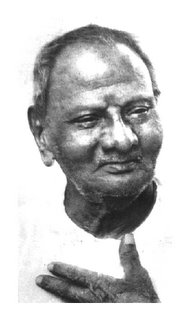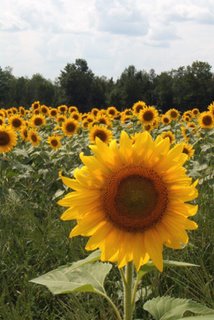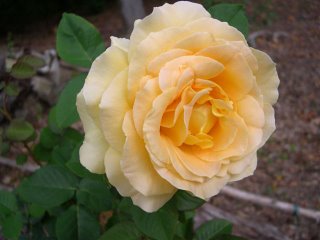Finding Your Peace
Peace is wherever you are. Look no further. It's at your elbow, waiting for your notice. You carry it around in your heart, even when you feel tormented and twisted. Let your peace rise and give you bliss. That's what it's there for.
Friday, March 31, 2006
Thursday, March 30, 2006
Clear Mind
"Clear mind is like the full moon in the sky. Sometimes clouds come and cover it, but the moon is always behind them. Clouds go away, then the moon shines brightly. So don't worry about clear mind: it is always there. When thinking comes, behind it is clear mind. When thinking goes, there is only clear mind. Thinking comes and goes, comes and goes, You must not be attached to the coming or the going."
—Zen Master Seung Sahn
Wednesday, March 29, 2006
Hard River
By James Finnegan
I pulled back
the jaundiced curtains
of the room rented
for four weeks in Wichita.
I didn't care
that the only thing I could see
from the window was the highway,
because I would watch the highway
the way I used to watch the river
with a six of beer and nowhere to go
after work, just watch
the cars and trucks
flow on and on, heading home
or to work or nowhere in particular,
knowing out there somewhere
someone was listening to the radio,
the same station I was listening to
with this man talking, just talking
into space, wavelengths over furrows
in the wide stretches of farmland,
knowing no one cares
about what he's saying,
still he talks and syllables and seconds
and dust settle like silt in the open air,
a child asleep across the backseat
of a car, tires throbbing over
slabs of pavement, no spare
in the trunk and two hundred miles
from here to wherever is there
on the hard river that carries them along
and if they're lucky
takes them home.
By James Finnegan
I pulled back
the jaundiced curtains
of the room rented
for four weeks in Wichita.
I didn't care
that the only thing I could see
from the window was the highway,
because I would watch the highway
the way I used to watch the river
with a six of beer and nowhere to go
after work, just watch
the cars and trucks
flow on and on, heading home
or to work or nowhere in particular,
knowing out there somewhere
someone was listening to the radio,
the same station I was listening to
with this man talking, just talking
into space, wavelengths over furrows
in the wide stretches of farmland,
knowing no one cares
about what he's saying,
still he talks and syllables and seconds
and dust settle like silt in the open air,
a child asleep across the backseat
of a car, tires throbbing over
slabs of pavement, no spare
in the trunk and two hundred miles
from here to wherever is there
on the hard river that carries them along
and if they're lucky
takes them home.
Up in the Morning Early
By Robert Burns
Up in the morning's no' for me,
Up in the morning early;
When a' the hills are coverd wi' snaw,
I'm sure it's winter fairly.
Cauld blaws the wind frae east to wast,
The drift is driving sairly;
Sae loud and shrill's I hear the blast,
I'm sure it's winter fairly.
The birds sit chittering in the thorn,
A' day they fare but sparely;
And lang's the night frae e'en to morn,
I'm sure it's winter fairly.
By Robert Burns
Up in the morning's no' for me,
Up in the morning early;
When a' the hills are coverd wi' snaw,
I'm sure it's winter fairly.
Cauld blaws the wind frae east to wast,
The drift is driving sairly;
Sae loud and shrill's I hear the blast,
I'm sure it's winter fairly.
The birds sit chittering in the thorn,
A' day they fare but sparely;
And lang's the night frae e'en to morn,
I'm sure it's winter fairly.
Tuesday, March 28, 2006
Comeback
By Tess Gallagher
My father loved first light.
He would sit alone
at the yellow formica table
in the kitchen with his coffee cup
and sip and look out
over the strait. Now,
in what could be
the end of my life, or worse,
the life of someone I love, I too
am addicted to slow sweet beginnings.
First bird call. Wings
in silhouette. How the steeples
of the evergreens make a selvage
for the gaunt emerging sky.
My three loves are far away
in other countries,
and one is even under
this dew-bright ground
where the little herds
of jittery quail peck
and scurry for their lives.
My father picks up his
cup. Light is sifting in
like a gloam of certainty
over the water. He knows
something there in the half light
he can't know any other way.
And now I know it with him: so much
is joining us in the dawn
that no one can ever be parted.
It steals over us because we left
the warm beds of our dreams
to sit beside what rises.
I think he wants to stay there
forever, my captain, gazing but not
expecting, while the world
begins, and, in a stark silent calling,
won't tell anyone what it's for.
By Tess Gallagher
My father loved first light.
He would sit alone
at the yellow formica table
in the kitchen with his coffee cup
and sip and look out
over the strait. Now,
in what could be
the end of my life, or worse,
the life of someone I love, I too
am addicted to slow sweet beginnings.
First bird call. Wings
in silhouette. How the steeples
of the evergreens make a selvage
for the gaunt emerging sky.
My three loves are far away
in other countries,
and one is even under
this dew-bright ground
where the little herds
of jittery quail peck
and scurry for their lives.
My father picks up his
cup. Light is sifting in
like a gloam of certainty
over the water. He knows
something there in the half light
he can't know any other way.
And now I know it with him: so much
is joining us in the dawn
that no one can ever be parted.
It steals over us because we left
the warm beds of our dreams
to sit beside what rises.
I think he wants to stay there
forever, my captain, gazing but not
expecting, while the world
begins, and, in a stark silent calling,
won't tell anyone what it's for.
Monday, March 27, 2006
Trees
By W. S. Merwin
I am looking at trees
they may be one of the things I will miss
most from the earth
though many of the ones I have seen
already I cannot remember
and though I seldom embrace the ones I see
and have never been able to speak
with one
I listen to them tenderly
their names have never touched them
they have stood round my sleep
and when it was forbidden to climb them
they have carried me in their branches
By W. S. Merwin
I am looking at trees
they may be one of the things I will miss
most from the earth
though many of the ones I have seen
already I cannot remember
and though I seldom embrace the ones I see
and have never been able to speak
with one
I listen to them tenderly
their names have never touched them
they have stood round my sleep
and when it was forbidden to climb them
they have carried me in their branches
Sunday, March 26, 2006
Poppies
By Mary Oliver
The poppies send up their
orange flares; swaying
in the wind, their congregations
are a levitation
of bright dust, of thin
and lacy leaves.
There isn't a place
in this world that doesn't
sooner or later drown
in the indigos of darkness,
but now, for a while,
the roughage
shines like a miracle
as it floats above everything
with its yellow hair.
Of course nothing stops the cold,
black, curved blade
from hooking forward—
of course
loss is the great lesson.
But I also say this: that light
is an invitation
to happiness,
and that happiness,
when it's done right,
is a kind of holiness,
palpable and redemptive.
Inside the bright fields,
touched by their rough and spongy gold,
I am washed and washed
in the river
of earthly delight—
and what are you going to do—
what can you do
about it—
deep, blue night?
Saturday, March 25, 2006
Friday, March 24, 2006
Thursday, March 23, 2006
Imagine yourself as constantly changing, like the water in the stream that you stepped in to get to one side and then stepped in again to get back to the side you left.
You are process; absent any fixed nature. Your personality is nothing more than a fleeting reflection that you see in the water's surface. Once you stop looking, the reflection and you disappear.
Don't fear your fleeting nature. Embrace it for that is who you are. By accepting your nature, you are free of all that holds you back from becoming who you really are.
You are process; absent any fixed nature. Your personality is nothing more than a fleeting reflection that you see in the water's surface. Once you stop looking, the reflection and you disappear.
Don't fear your fleeting nature. Embrace it for that is who you are. By accepting your nature, you are free of all that holds you back from becoming who you really are.
Wednesday, March 22, 2006
Heed
If, as in a dream, you see a light brighter than the sun, your remaining attachments will suddenly come to an end and the nature of reality will be revealed.
Such an occurrence serves as the basis for enlightenment. But this is something only you know. You can't explain it to others.
Or if, while you're walking, standing, sitting, or lying in a quiet grove, you see a light, regardless of whether it's bright or dim, don't tell others and don't focus on it. It's the light of your own nature.
Of if, while you're walking, standing, sitting, or lying in the stillness and darkness of night, everything appears as though in daylight, don't be startled. It's your own mind about to reveal itself.
Or if, while you're dreaming at night, you see the moon and stars in all their clarity, it means the workings of your mind are about to end. But don't tell others.
Bodhidharma
Tuesday, March 21, 2006
Duality and non-duality in science and religion
By Mark MacDowell and Paul Utukuru, Science & Theology News, May 26, 2005
-Article Reprint-
A major problem in modern cosmology is related to the issue of duality and non-duality.
Sylvania, Ohio (USA) -- A bad workman blames his tools, but what if the tools are just not sharp enough for the job? A major problem in modern cosmology is related to the issue of duality and non-duality, which is directly related to the only tool available to us: mathematics. With math, we try to trace back the origins of our universe to the point when space and time did not exist.
Can cosmology provide insight into science and religion?
All goes well until we get to just a moment after the big bang. Beyond that, our mathematics breaks down and refuses to go back any further to the exact moment of the event, usually referred to as the space-time singularity.
This breakdown occurs for two reasons. One is that our cosmological mathematics is either time-dependent, meaning that there is no change in space without some reference to a change in time, or space-dependent, meaning that there is no time without some reference to a change in space. That being the case, how can we ever describe mathematically the space-time singularity that doesn’t exist in space-time?
This problem boils down to our inability to establish a connected relationship between the singularity at the moment of the big bang and the multiplicity after the big bang. What seems to be necessary is a mathematical formalism which is space-time independent. Obviously, no such thing exists.
The other reason for our inability to reach the space-time singularity with our mathematics is our inability to derive duality or multiplicity from none or the One. In other words, how did the two and the many come from the One or none if there was only one or none to begin with?
In this context, the major religions prevailing in the world today can be divided into two broad categories, theistic and non-theistic. The theistic ones can be further divided into a monotheistic group and a polytheistic group. Among the strictly monotheistic ones are all three Abrahamic religions and Sikhism. The polytheistic group includes such religions as Shinto, the Native American Toltec tradition and the new neo-paganism emerging in some parts of Europe. The non-theistic group includes Buddhism, Jainism, Taoism and the like. Hinduism is both polytheistic and monotheistic, even though most Hindus are quick to argue that their numerous deities are but different manifestations of the One God. Furthermore, Hinduism is also nontheistic in the sense that the metaphysics of Hindu Vedanta is almost identical to that of Buddhism.
Contrary to popular belief, there is indeed a common metaphysical thread that runs through all the religions listed above. And that is the notion of oneness of name and form that permeates our world. It is described as the “Great One” in the Dead Sea Scrolls and as God the Father in Christianity. It is referred to as Sunyata in Buddhism and as Brahman in Hindu Vedanta. Although this concept of oneness occurs in so many different locations in the holy books and verbal transmissions of all the religions of the world, the way it is addressed in Buddhism and Vedanta can be subjectively realized and experimentally validated.
These traditions recognize that all our perceptions and our conceptions, including our languages and our mathematical tools, involve duality and multiplicity. Buddhism at its most austere is expressed in its “Middle Path.” Using the dialectic as a cathartic device, it takes a strong logical position that all language is dualistic because in order to define a term one must define its “anti-term” — its opposite. One cannot speak of any concept without at the same time giving equal credence to the existence of its opposite. For example, there would be no “left” without “right,” no “up” without “down,” no “athlete” without “couch potato,” no “blue” without “non-blue.” Even a concept as simple as “tree” is dependent on “non-tree ” for its definition.
What does this mean? In general, it means one cannot create a term in a vacuum. With nothing against which it can be contrasted, a term is meaningless. Therefore, to describe “The Great One” using language that is dualistic or multiplistic is meaningless.
To experience the Great One, the recognized pathway among the theistic religions is prayer and revelation. But if trying to describe what is essentially ineffable is a misdirected effort, what might work is something that enables you to transcend you own mind and take it out of space-time. This is where yogic practices such as meditation, repetitive chanting and reflective Zen come into the picture.
Thus, all the seemingly independent concepts in our vocabulary are actually a giant compendium with intersecting origins. This “dependent origination” also applies to the real world we live in. For example, we would not exist if it weren’t for the plants that just happen to exhale exactly the same mixture of gases that we couldn’t exist without. Likewise, we exhale exactly the same mixture that they need.
What about our planet? Isn’t it an independent entity? Hardly! Our own planet came from somewhere and is sustained by something. Without the sun, we would freeze quicker than you could read about it. Comets of a non-earthly origin are thought to have brought water to earth and actually seeded the potential for life here. Our own sun is dependent on its own “birth galaxy” and our galaxy is dependent upon its own “birth cluster,” and so it goes. Therefore, nothing in our universe has any real independent existence.
The Buddhist sees our whole world as full of hints or arrows pointing to non-duality, and it is interesting that modern science is also slowly picking up on non-duality. Quantum teleportation as well as the Bose-Einstein condensate are two shining examples. In both cases, what appear to be separate particles or entities act as a unit not separated in time. The Buddhist would take these facts as an intellectual starting point, the furthest outpost of rationality, from which to make the leap from the four dimensions of here and now, to that which lies beyond the four dimension of space-time: the non-dual. Sufism and other mystical disciplines involve the same sort of techniques.
Religion can encourage the student to contemplate dependent origination exhibited by nature as well as dependent origination in language as a springboard to a “higher truth” of intuitional insight. This insight, called prajnaparamita in Buddhism, goes beyond where language and conceptualization function into a non-dual higher reality: that “Great One” from which we all come and to which we all shall return.
-------------
Mark MacDowell is a professor of philosophy at Lourdes College in Sylvania, Ohio. Paul Utukuru is a retired medical physicist.
More Doctors are Believers
The first study of physician religious beliefs has found that 76 percent of doctors believe in God and 59 percent believe in some sort of afterlife. The survey, performed by researchers at the University of Chicago and published in the July 2005 issue of the Journal of General Internal Medicine, found that 90 percent of doctors in the United States attend religious services at least occasionally, compared to 81 percent of all adults. Fifty-five percent of doctors say their religious beliefs influence how they practice medicine.
These results were not anticipated. Religious belief tends to decrease as education and income levels increase, yet doctors are highly educated and, on average, well compensated. The finding also differs radically from 90 years of studies showing that only a minority of scientists (excluding physicians) believes in God or an afterlife.
Read more here.
The first study of physician religious beliefs has found that 76 percent of doctors believe in God and 59 percent believe in some sort of afterlife. The survey, performed by researchers at the University of Chicago and published in the July 2005 issue of the Journal of General Internal Medicine, found that 90 percent of doctors in the United States attend religious services at least occasionally, compared to 81 percent of all adults. Fifty-five percent of doctors say their religious beliefs influence how they practice medicine.
These results were not anticipated. Religious belief tends to decrease as education and income levels increase, yet doctors are highly educated and, on average, well compensated. The finding also differs radically from 90 years of studies showing that only a minority of scientists (excluding physicians) believes in God or an afterlife.
Read more here.
Monday, March 20, 2006
Saturday, March 18, 2006
I Needed This One
"Often we see other sentient beings as hassles: "This mosquito is disturbing me. Those politicians are corrupt. Why can't my colleagues do their work correctly?" and so on. But when we see sentient beings as being more precious than a wish-fulfilling jewel, our perspective completely changes. For example, when we look at a fly buzzing around, we train ourselves to think, "My enlightenment depends on that fly."
This isn't fanciful thinking because, in fact, our enlightenment does depend on that fly. If that fly isn't included in our bodhicitta, then we don't have bodhicitta, and we won't receive the wonderful results of generating bodhicitta--the tremendous purification and creation of positive potential.
Imagine training your mind so that when you look at every single living being, you think, "My enlightenment depends on that being. The drunk who just got on the bus--my enlightenment depends on him. The soldier in Iraq--my enlightenment depends on him. My brothers and sisters, the teller at the bank, the janitor at my workplace, the president of the United States, the suicide bombers in the Middle East, the slug in my garden, my eighth-grade boyfriend, the babysitter when I was a kid--my enlightenment depends on each of them." All sentient beings are actually that precious to us."
Source: Cultivating a Compassionate Heart: The Yoga Method of Chenrezig by Bhikshuni Thubten Chodron
Achieiving Buddhahood
"According to Highest Yoga Tantra, some persons attain Buddhahood in one lifetime, and because these persons are not born with a body adorned with the major and minor marks they must achieve such a body through the practice of deity yoga.
Meditation on oneself as undifferentiable from a deity is the special cause... for attaining Buddhahood. If one meditated only on emptiness and did not cultivate any method--either that of the Perfection or that of the Mantra Vehicle--one would fall to the fruit of a Hinayana Foe Destroyer. In order to attain the definite goodness of the highest achievement, Buddhahood, deity yoga is needed. Also, ...one must view one's body clearly as a divine body and train in the pride of being a deity. Without deity yoga the Mantra path is impossible; deity yoga is the essence of Mantra. "
Source: Tantra in Tibet by His Holiness the Dalai Lama
"According to Highest Yoga Tantra, some persons attain Buddhahood in one lifetime, and because these persons are not born with a body adorned with the major and minor marks they must achieve such a body through the practice of deity yoga.
Meditation on oneself as undifferentiable from a deity is the special cause... for attaining Buddhahood. If one meditated only on emptiness and did not cultivate any method--either that of the Perfection or that of the Mantra Vehicle--one would fall to the fruit of a Hinayana Foe Destroyer. In order to attain the definite goodness of the highest achievement, Buddhahood, deity yoga is needed. Also, ...one must view one's body clearly as a divine body and train in the pride of being a deity. Without deity yoga the Mantra path is impossible; deity yoga is the essence of Mantra. "
Source: Tantra in Tibet by His Holiness the Dalai Lama
Friday, March 17, 2006
Thursday, March 16, 2006
Wednesday, March 15, 2006
The Greatest
The greatest achievement is selflessness.
The greatest worth is self-mastery.
The greatest quality is seeking to serve others.
The greatest precept is continual awareness.
The greatest medicine is the emptiness of everything.
The greatest action is not conforming with the worlds ways.
The greatest magic is transmuting the passions.
The greatest generosity is non-attachment.
The greatest goodness is a peaceful mind.
The greatest patience is humility.
The greatest effort is not concerned with results.
The greatest meditation is a mind that lets go.
The greatest wisdom is seeing through appearances.
--Atisha
Tuesday, March 14, 2006
How We Experience Ourselves
"A human being is part of a whole, called by us the “universe,” a part limited in time and space. He experiences himself, his thoughts and feelings, as something separate from the rest — a kind of optical delusion of his consciousness. This delusion is a kind of prison for us, restricting us to our personal desires and to affection for a few people near us. Our task must be to free ourselves from this prison by widening our circle of compassion to embrace all living creatures and the whole of nature in its beauty."
— Albert Einstein
"A human being is part of a whole, called by us the “universe,” a part limited in time and space. He experiences himself, his thoughts and feelings, as something separate from the rest — a kind of optical delusion of his consciousness. This delusion is a kind of prison for us, restricting us to our personal desires and to affection for a few people near us. Our task must be to free ourselves from this prison by widening our circle of compassion to embrace all living creatures and the whole of nature in its beauty."
— Albert Einstein
Monday, March 13, 2006
Artistic Doors from Morocco
They say something to you. Something distant, but inviting. Ageless, but always true. Colorful, and deeply filling. The doors beckon to you, then haunt you. They make you find a part of yourself that you never knew you had. Knock and await. They will open. Something new will be known.



They say something to you. Something distant, but inviting. Ageless, but always true. Colorful, and deeply filling. The doors beckon to you, then haunt you. They make you find a part of yourself that you never knew you had. Knock and await. They will open. Something new will be known.



 Nisargadatta Maharaj
Nisargadatta MaharajAuthor of I am That
"That which you are, your true self, you love it, and whatever you do, you do for your own happiness. To find it, to know it, to cherish it is your basic urge. Since time immemorial you loved yourself, but not wisely. Use your body and mind wisely in the service of the self, that is all.
Be true to your own self, love your self absolutely. Do not pretend that you love others as yourself. Unless you have realized them as one with yourself, you cannot love them. Don’t pretend to be what you are not, don’t refuse to be what you are. Your love of others is the result of selfknowledge, not its cause. Without self-realization, no virtue is genuine.
When you know beyond all doubting that the same life flows through all that is, and you are that life, you will love all naturally and spontaneously. When you realize the depth and fullness of your love for yourself, you know that every living being and the entire universe are included in your affection. But when you look at any thing as separate from you, you cannot love it for you are afraid of it. Alienation causes fear and fear deepens alienation. It is a vicious circle. Only self-realization can break it. Go for it resolutely."
Sunday, March 12, 2006
Saturday, March 11, 2006
Friday, March 10, 2006
How We Get There
"The Mystery Schools of antiquity ... gave out deep esoteric knowledge, but at the cost of enormous labor. However, there existed among those teachers certain irresponsible ones who were rash enough to support their endeavors with drugs and poisons in order to give the illusion to their disciples of hastening their flight to the heights. But it is only an illusory push into the superconscious that drugs give; in actuality the mind is brought into a state of trance. By means of his mental powers, from previously received fragmented stimuli, the disciple pieces together completely new pictures which impress him as supercelestial and entirely new. Then people talk of wonderful scenes, preternaturally beautiful colors and fantastic forms. Here lies a great mistake.
Impulsion into spiritual realms can never occur artificially by means of drugs. It can be effected only through selfless spiritual labor, by meditation and prayer.
Source: Drugs and the Effect on the Soul, Lilo Linne, Eclectic Theosophist, June 1971
Principle of No Harm
What good is a man's knowledge unless it prompts him to
Prevent the pain of others as if it were his own pain?
Any actions which a man knows would harm himself
He should not inflict on others.
The supreme principle is this: Never knowingly
Harm anyone at any time in any way.
-Tirukkural 32: 315-317
What good is a man's knowledge unless it prompts him to
Prevent the pain of others as if it were his own pain?
Any actions which a man knows would harm himself
He should not inflict on others.
The supreme principle is this: Never knowingly
Harm anyone at any time in any way.
-Tirukkural 32: 315-317
Thursday, March 09, 2006
Not Far from Buddhahood
A university student while visiting Gasan asked him: "Have you ever read the Christian Bible?"
"No, read it to me," said Gasan.
The student opened the Bible and read from St. Matthew: "And why take ye thought for raiment? Consider the lilies of the field, how they grow. They toil not, neither do they spin, and yet I say unto you that even Solomon in all his glory was not arrayed like one of these. . . . Take therefore no thought for the morrow, for the morrow shall take thought for the things of itself."
Gasan said: "Whoever uttered those words I consider an enlightened man."
The student continued reading: "Ask and it shall be given you, seek and ye shall find, knock and it shall be opened unto you. For everyone that asketh receiveth, and he that seeketh findeth, and to him that knocketh, it shall be opened."
Gasan remarked: "That is excellent. Whoever said that is not far from Buddhahood."
Wednesday, March 08, 2006
Another View on Consciousness
"Nature gets credit which in truth should be reserved for ourselves, the rose of its scent, the nightingale for his song, and the sun for its radiance. The poets are entirely mistaken. They should address their lyrics to themselves and should turn them into odes of self-congratulations on the excellence of the human mind. Nature is a dull affair, soundless, scentless, colorless, merely the hurrying of material, endlessly, meaninglessly."
--Alfred North Whitehead
Tuesday, March 07, 2006
Is Consciousness a Form of Energy?
The essence of the argument is this: Consciousness is a form of matter-energy, with its roots in physical matter. In short, the "consciousness as a form of energy" view assumes that consciousness is an objective reality rather than a subjective (or inter-subjective) one.
This is no small issue. For that "matter," the whole problem surrounding consciousness is incredibly complex. There is a lot riding on this issue in case you haven't thought about it. Look around at the number of spirituality, psychology, and healing books that assume, in one way or another, that our consciousness is a subtle, non-measurable form of energy.
According to the contemporary philosopher Christian de Quincey, consciousness cannot be logically argued to be a form of matter-energy. Here is the essence of his critique of why it can't.
"The essence of my critique is the following quite straightforward logic:
1. Consciousness is either physical or nonphysical (there can be no middle option).
2. Consciousness is either a physical form of energy or it is a “nonphysical” form of energy.
3. If consciousness is physical energy, then we reduce it to physics (as materialists unsuccessfully try to do).
4. If consciousness is nonphysical energy, then we need to explain what we mean by “nonphysical energy.”
5. If we cannot make a meaningful and coherent distinction between “physical energy” and “nonphysical energy," then we may ask why use the term “nonphysical energy” at all?
6. If “nonphysical energy” is a phrase empty of meaningful content, and consciousness is not physical energy, therefore . . .
7. Consciousness cannot be any form of energy. It has a different kind of reality."
What is a better way to view consciousness? As much as we may love quantum physics, I would argue we are better off viewing consciousness as our most intimate subjective (inter-subjective) reality. It is our sense of interiority, and our personal experience of the world and all it contains. Why deprive ourselves of what is most precious to us: our sense of our own beingness. Reducing that experience to "subtle energy mechanics" seems a dangerous mistake to me.
As de Quincey says, "energy flows, and consciousness knows."

Baseball fans everywhere will miss him.
Kirby Puckett
Born: March 14, 1960, Chicago, Illinois
Died: March 6, 2006, Phoenix, Arizona
From the Baseball Hall of Fame records: A fun-loving and gregarious ball player, Kirby Puckett totaled 12 solid seasons with the Minnesota Twins. The 1982 first-round draft choice hit for power and average, batting .318 with 207 home runs. A true team leader, Puckett led the Twins to a pair of World Series titles in 1987 and 1991. The six-time Gold Glove winner was named to 10 consecutive All-Star teams from 1986 to 1995. Puckett finished among the top 10 in MVP voting seven times, only to have his career end prematurely after the 1995 season due to irreversible retina damage in his right eye.
Monday, March 06, 2006
Magic Garden
When we touch this domain, we are filled with the cosmic force
of life itself, we sink our roots deep into the black soil and draw
power and being up into ourselves. We know the energy of the
numen and are saturated with power and being. We feel grounded,
centered, in touch with the ancient and eternal rhythms of life.
Power and passion well up like an artesian spring and
creativity dances in celebration of life.
-David N. Elkins
The Sacred as Source of Personal Passion and Power
When we touch this domain, we are filled with the cosmic force
of life itself, we sink our roots deep into the black soil and draw
power and being up into ourselves. We know the energy of the
numen and are saturated with power and being. We feel grounded,
centered, in touch with the ancient and eternal rhythms of life.
Power and passion well up like an artesian spring and
creativity dances in celebration of life.
-David N. Elkins
The Sacred as Source of Personal Passion and Power
Sunday, March 05, 2006
Saturday, March 04, 2006
Friday, March 03, 2006
Nicely said...
I remember a short conversation between the Buddha and a philosopher of his time.
"I have heard that Buddhism is a doctrine of enlightenment. What is your method? What do you practice everyday?"
"We walk, we eat, we wash ourselves, we sit down."
"What is so special about that? Everyone walks, eats, washes, sits down..."
"Sir, when we walk, we are aware that we are walking; when we eat, we are aware that we are eating...When others walk, eat, wash, or sit down, they are generally not aware of what they are doing."
Thich Nhat Hanh, Zen Keys
I remember a short conversation between the Buddha and a philosopher of his time.
"I have heard that Buddhism is a doctrine of enlightenment. What is your method? What do you practice everyday?"
"We walk, we eat, we wash ourselves, we sit down."
"What is so special about that? Everyone walks, eats, washes, sits down..."
"Sir, when we walk, we are aware that we are walking; when we eat, we are aware that we are eating...When others walk, eat, wash, or sit down, they are generally not aware of what they are doing."
Thich Nhat Hanh, Zen Keys
On Meditation
"People often confuse meditation with prayer, devotion, or vision. They are not the same. Meditation as a practice does not address itself to a deity or present itself as an opportunity for revelation. This is not to say that people who are meditating do not occasionally think they have recieved a revelation or experienced visions. They do. But to those for whom meditation is their central practice, a vision or a revelation is seen as just another phenemenon of consciousness and as such is not to be taken as exceptional. The meditator would simply experience the ground of consciousness, and in doing so avoid excluding or excessively elevating any thought or feeling. To do this one must release all sense of the "I" that might think it is privileged to communicate with the divine."
Gary Snyder, Tricycle: The Buddhist Review, Vol. I, #1
"People often confuse meditation with prayer, devotion, or vision. They are not the same. Meditation as a practice does not address itself to a deity or present itself as an opportunity for revelation. This is not to say that people who are meditating do not occasionally think they have recieved a revelation or experienced visions. They do. But to those for whom meditation is their central practice, a vision or a revelation is seen as just another phenemenon of consciousness and as such is not to be taken as exceptional. The meditator would simply experience the ground of consciousness, and in doing so avoid excluding or excessively elevating any thought or feeling. To do this one must release all sense of the "I" that might think it is privileged to communicate with the divine."
Gary Snyder, Tricycle: The Buddhist Review, Vol. I, #1
Thursday, March 02, 2006
Outskirts
By Tomas Tranströmer
Translated by Robert Bly
Men in overalls the same color as earth rise from a ditch.
It's a transitional place, in stalemate, neither country nor city.
Construction cranes on the horizon want to take the big leap,
but the clocks are against it.
Concrete piping scattered around laps at the light with cold tongues.
Auto-body shops occupy old barns.
Stones throw shadows as sharp as objects on the moon surface.
And these sites keep on getting bigger
like the land bought with Judas' silver: "a potter's field for
burying strangers."
By Tomas Tranströmer
Translated by Robert Bly
Men in overalls the same color as earth rise from a ditch.
It's a transitional place, in stalemate, neither country nor city.
Construction cranes on the horizon want to take the big leap,
but the clocks are against it.
Concrete piping scattered around laps at the light with cold tongues.
Auto-body shops occupy old barns.
Stones throw shadows as sharp as objects on the moon surface.
And these sites keep on getting bigger
like the land bought with Judas' silver: "a potter's field for
burying strangers."
The Snowfall Is So Silent
By Miguel de Unamuno
Translated by Robert Bly
The snowfall is so silent,
so slow,
bit by bit, with delicacy
it settles down on the earth
and covers over the fields.
The silent snow comes down
white and weightless;
snowfall makes no noise,
falls as forgetting falls,
flake after flake.
It covers the fields gently
while frost attacks them
with its sudden flashes of white;
covers everything with its pure
and silent covering;
not one thing on the ground
anywhere escapes it.
And wherever it falls it stays,
content and gay,
for snow does not slip off
as rain does,
but it stays and sinks in.
The flakes are skyflowers,
pale lilies from the clouds,
that wither on earth.
They come down blossoming
but then so quickly
they are gone;
they bloom only on the peak,
above the mountains,
and make the earth feel heavier
when they die inside.
Snow, delicate snow,
that falls with such lightness
on the head,
on the feelings,
come and cover over the sadness
that lies always in my reason.
Subscribe to:
Posts (Atom)









